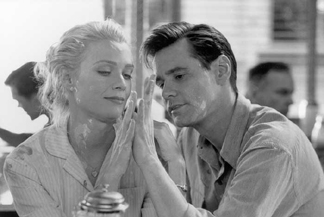Exhuming Frank Capra
Carrey and Company Serve Up Over-cooked Corn in 'Majestic'
By Patrick Reed

We're in the mood for forced sentiment.
Predicting the upcoming adjectives and promotional phrases to be used in The Majestic's publicity campaign is a cinch after seeing the movie - swipe the style guide of your average political speechwriter and you're all set. "Old-fashioned," "Patriotic," "A Celebration of American Values," and "What This Country Needs Right Now" are all bound to be found in the advertisement blurbs, as are any comparisons to the films of Frank Capra, for a time America's foremost mythmaker (or propagandist). Cue up the following Capra films from the thirties and forties for an idealized vision of the U.S. as a land where truth, simplicity, and moral integrity prevail over the powers that corrupt: Mr. Deeds Goes To Town, Mr. Smith Goes To Washington, You Can't Take It With You, and of course the Christmas perennial It's A Wonderful Life. Wouldn't life be wonderful indeed if a contemporary movie could capture some of that good ol' Capra-corn and serve it back out to audiences already intoxicated with "Greatest Generation" nostalgia? Such a film sounds like a safe bet for a Best Picture nomination, to be sure. Well, in the case of The Majestic, the operative word is safe.
The Majestic is redolent with the scent of prestige - grand production design, a large cast with many familiar supporting actors, and a director and star with proven track records. During the nineties, Frank Darabont adapted two Stephen King novellas into The Shawshank Redemption (1996) and The Green Mile (1999), both of which earned Best Picture nods and are destined for endless replay on cable television - Shawshank's already on twice a month, it seems. Furthermore, the film's leading man, Jim Carrey, has risen from humble beginnings (eighties stand-up comedy grind, the "white dude" on TV's In Living Color, B-movies like '94's Ace Ventura: Pet Detective) to become one of Hollywood's more bankable movie stars. All of the preliminary bases look to be covered - but then there's the actual movie
Los Angeles, 1951: Carrey plays Peter Appleton, an emerging screenwriter who, after being blacklisted by his paranoid studio bosses, drives up the California coast, loses his memory in a violent wreck, and is welcomed into a quaint small town called Lawson that lost a staggering amount of young men to WW II. Appleton is quickly mistaken for one Luke Trimble, the presumed-dead son of Harry, the town's former cinema manager (hammy Martin Landau attacks many of his lines like a famished hyena on the Serengeti). Harry's precious building, the Majestic, went out of business and into squalor in the years since the war, and no one else in Lawson has snapped out of their collective funk either. Luke thus serves as a near-messiah, a symbol of Lawson's sacrifice and renewed hope, and soon the Majestic is re-opened and running. There's a re-kindled romance as well, between Luke and his former teenage sweetheart, a law student named Adele (Laurie Holden, from TV's X-Files). Of course, Luke is not Luke, Luke is an amnesiac screenwriter, and the House Un-American Activities Committee is searching for him, hoping that he'll "name names."
What happens when Appleton recovers his memory, and his identity? WellThe Majestic takes a long, looong time to work through its totally predictable plot, and what's worse, any possible compensating qualities (acting, musical score, even editing) are overbearing - we're talking about bald-faced, weapons-grade sentimentality on display. The Majestic reaches for emotional intensity, time and time again - there's a deathbed scene, a graveside confrontation, and a courtroom defense of the First Amendment that re-hashes previous Hollywood takes on the "red scare" - but Darabont and screenwriter Michael Sloane have crafted such an obedient homage to Frank Capra and other golden-age films such as The Best Years Of Our Lives (1946) that their own movie ultimately comes across as lifeless. Leaving aside Capra's politics and values for a moment, in terms of craft his best films were off the charts, but here Sloane's script and Darabont's direction are about as engaging as an Ari Fleischer press conference. Unsurprisingly, Jim Carrey is light years below Gary Cooper/Jimmy Stewart's standard as well - his delusional bid to move beyond Looney Toons comedy and into Tom Hanks everyman-territory really should come to an end. Much has been made in the media about the supposed "death of irony" in American culture since the terrorist attacks on September 11; according to this line of thought, we now crave, and are due for, some feel-good, rousing, pro-American entertainment. For those who desire such a world, The Majestic aims to please but you'd be way better off passing on this pointless contrivance, and checking the classic movie channel for reruns of Messrs. Deeds and Smith instead.